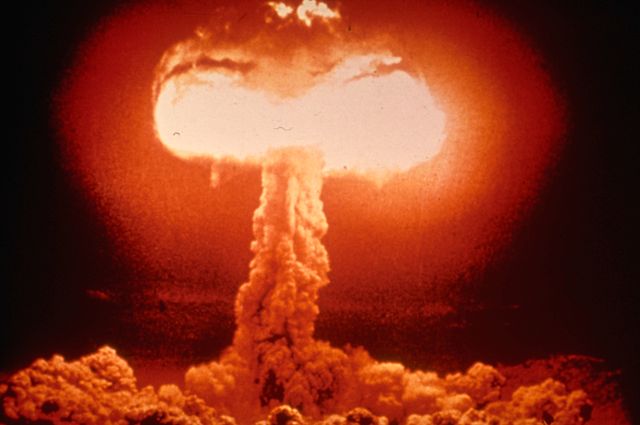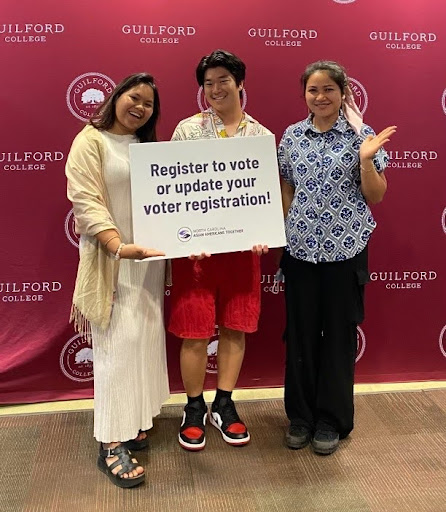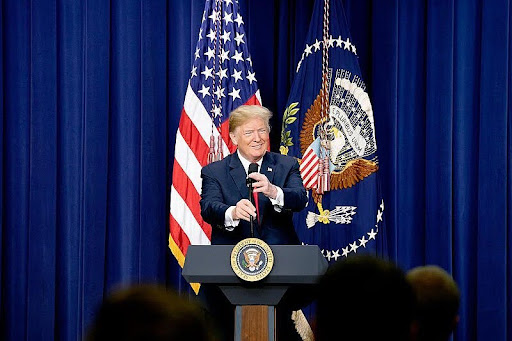Panel addresses North Korea’s nuclear activity
On Monday, Sept. 4, Guilford College hosted a panel entitled Nuclear Weapons & Threats of War: North Korea & the United States of America, inviting students, faculty and the greater Guilford community to participate in an open discussion regarding recent political turmoil between the U.S. and North Korea.
Hosting the panel was a joint effort between the College’s International Studies Program, the Department of Religious Studies, the Center for Principled Problem Solving and the Friends Center.
North Korea recently conducted a nuclear test firing a ballistic missile. The launch was North Korea’s biggest yet, causing alarm and tension not only with the U.S., but with neighboring China, Russia and Japan. The prospect of potential war has sparked a dire need for conversations that go beyond shocking headlines and quick judgment assumptions.
“The event was fundamentally designed to try to help educate our students and community about an acutely important issue … that of potential nuclear war,” said Associate Professor of Religious Studies Eric Mortensen in an email interview. Mortenson acted as moderator for the panel discussion.
“… Given the escalating and very real tensions between the governments of North Korea … and the USA—tensions directly involving nuclear tests, intercontinental ballistic missiles, and belligerent leaders—we are faced with the heinous need to pay attention to what is going on,” said Mortensen.
And Guilford College is paying attention.
The four panelists, Associate Professor of Physics Don Smith, Associate Professor and Chair of Political Science George Guo, Associate Professor of History Zhihong Chen and guest speaker Linda Brady, Professor of Political Science and former Chancellor of University of North Carolina in Greensboro, sought to unpack exactly what is happening.
Together their presentations provided a well-rounded historical, political, economic and scientific perspective of the current conversation, and how the U.S. might move forward in a peaceful and realistic way.
Zhihong Chen began the discussion with her presentation, “North Korea: The History of the Conflict and the Path to Current Tensions.”
Chen focused on getting away from the prejudice narrative that has saturated our views of North Korea, reminding us that there have been several responsible parties.
The U.S. specifically played a large role in the official division of the Korean peninsula in 1953, and the creation of strained political and economic relations between North Korea and foreign powers. This insight brought Chen to her final point.
“Perhaps we need to change the way that we think about North Korea (and) U.S. tension,” Chen said.
“Without knowing the full history of how the peninsula was divided, we tend to point fingers to … North Korea as the problem and we, the U.S., as the solution…the U.S. was a heavy part in the making of this problem. … changing the way we think about the tensions would help us to produce some useful thoughts (for conflict resolution).”
Mortensen echoed Chen’s thoughts.
“I worry that too often, and too easily we dismiss the ‘other’ as insane or irrational, and simplistically demonize adversaries. One hope for this panel was that we might learn how to interrogate such overly simplistic views.”
Like Chen, visiting speaker Linda Brady of UNCG’s political science department, agreed that moving forward means moving humbly.
In her concluding presentation, “Bargaining and Brinkmanship: The U.S. and North Korea in 2017,” Brady provided an analysis of the various “playing strategies” both North Korea and the U.S. have employed at the negotiating table just in the last year. Her recommendation to the U.S. is to “be the adult in the room” by stepping back from our demands, and instead asking the question, “What does North Korea want?”
“The U.S. as the stronger party has the greatest responsibility to act in a way that will help de-escalate the crisis,” Brady said. “The only way we’re going to get anywhere is if we accept the reality that we’re going to be dealing with a nuclear North Korea…and go from there.”
“What are the motivations behind North Korea’s actions, and how can a historically contextualized understanding of North Korea’s perspective help us to understand the wisdom, or lack thereof, of U.S. foreign policy decisions.” Mortensen said.
The takeaway from the night was jarring in its simplicity. In order for a productive negotiation to take place, the U.S. must yield their demands and instead begin to listen. Realistic resolution comes with compromise and perhaps letting go of some of that American pride.









